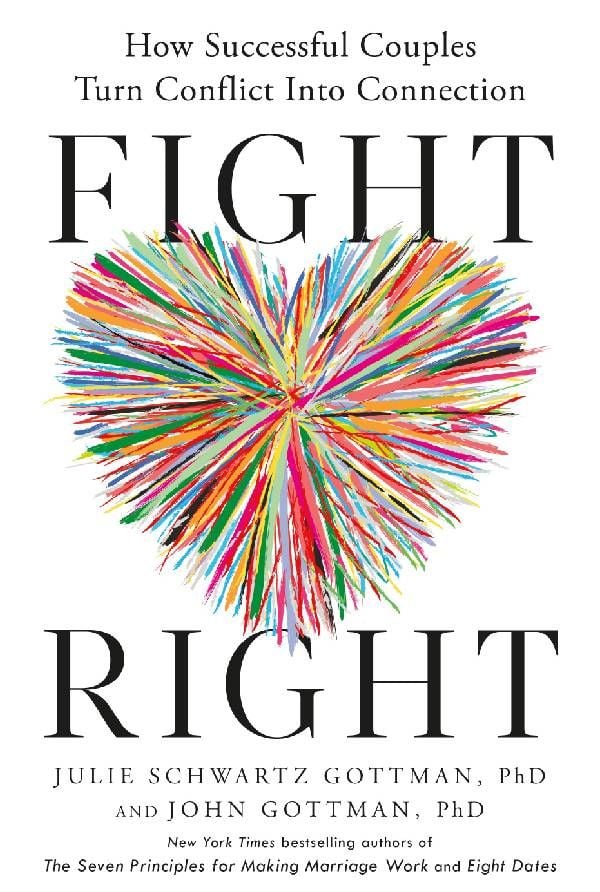Is There a Right Way to Fight with Your Partner?
Relationship expert Dr. Julie Gottman says if done right, fighting can lead to greater intimacy and connection
Throughout their marriage, my parents argued a lot. Sometimes, it was constant under-breath bickering about little things, while other times, their fights were louder and could escalate to the point that they didn't speak to each other for several days.

As a kid, I wasn't quite sure if what I witnessed between them was "normal" marital discord or something more (for the record, they remained married until my father passed away at 82.) All I knew was that I wished they got along better, or at least faked it a little more in front of my brothers and me.
I vowed that when I got married, I wouldn't fight with my spouse or let my kids be privy to any disagreements between their parents.
Witnessing the discord in my parents' marriage, as a kid, I vowed that when I got married, I wouldn't fight with my spouse or let my kids be privy to any disagreements between their parents. I hoped to emulate my marital role models, Carol and Mike Brady of the 1970s show, "The Brady Bunch." They were able to solve their disagreements amicably, never raising their voices or going to bed angry. Those were my goals for marriage.
But of course, Mike and Carol Brady are fictional characters; most real-life couples fight and fighting isn't necessarily bad for a relationship. If you have the tools, fighting can help couples connect to one another.
Such is the premise of the new book "Fight Right: How Successful Couples Turn Conflict Into Connection" by couples therapists Drs. Julie and John Gottman. The book is based on 50 years of research with over 3,000 couples. They will also be participating in Ted2024, "The Brave and the Brilliant," in April.
In an interview, Dr. Julie Gottman says, "There are successful, happy couples who employ an avoidance style in handling conflict and never fight. But most couples fight and done right, fighting can lead to greater intimacy and connection."
Let Go of Gender Bias
Books like "Men Are from Mars; Women Are from Venus" put men and women on opposite sides, perpetuating the myth that it's impossible for them to understand one another.
Gottman says, "Generally, women are taught that expressing themselves is wrong. They are told they are 'too emotional' or labeled by society as 'angry bitches' if they speak up for what they want. Conversely, many men feel unable to express their feelings for fear of being labeled 'weak' or 'vulnerable.'"
"Everyone of every gender has needs and vulnerabilities," says Gottman. "For many, admitting this has been difficult, especially if their emotions have been dismissed in the past."
When couples fight right, they allow both partners to communicate their needs safely without alienation or judgment.
Beware of the 'Four Horsemen'
Gottman explains that when it comes to fighting right, there are "four horsemen of the apocalypse" to avoid when communicating with a partner:
- Stonewalling
- Criticism
- Contempt
- Defensiveness
"When you employ any of these communication styles, you make it harder for your partner to understand what is bothering you and more difficult to get what you need," says Gottman.
Instead of being critical, offer your partner a way to shine for you. For example, rather than saying, "Why can't you ever load the dishwasher?" say, "It would help me if you could load the dishwasher tonight."
Employ a 5 to 1 Ratio
Couples should employ what Gottman calls a "5 to 1" ratio when discussing an issue. She explains, "Discussions between partners should have five positive interactions to each negative. Positive interactions include things like a smile, a nod, an affectionate touch, humor or signs of listening. A negative interaction includes saying something critical, a frown or ignoring what a partner says."
"When partners engage in an argument to win, they become locked into a destructive situation."
Let Go of Winning
In a boxing match, the participants are opponents looking to win the fight. But in a fight with a romantic partner, "winning" should never be the objective. Gottman says, "When partners engage in an argument to win, they become locked into a destructive situation."
Change the focus of an argument to both partners understanding one another rather than one partner being victorious. "Arguments should be productive and enriching, not hurtful," says Gottman.
Communicate Better
Being an "active listener" isn't just letting your partner speak and repeating what they have said to prove you heard them. "If you repeat back, 'So what you are saying is I am a loser,' it defeats the purpose," explains Gottman. "All the person heard was the criticism. Active listening fails because it doesn't include the importance of how the speakers express themselves."
The same is true for using "I" sentences. The idea is to put the onus on yourself. But if you say, "I feel angry when you don't bring in the groceries," your partner may only hear the negativity and not take in the sentiment. "Using 'I' in a positive way, such as, "I'd appreciate if you brought in the groceries,' is a more effective way of getting your point across," explains Gottman.
Another fighting no-no is using generalizations. Words like "always" and "never" are seen as criticisms and work to inflame tense situations.
"It can take time to break bad habits and unhealthy fighting styles."
The Art of Apologizing
Sometimes, a partner will apologize without really being sorry to end the fight. Or they will apologize without genuinely knowing why their partner was upset. Either way, an apology without real meaning isn't helpful.
If you have yet to discuss the issue and the impact of the behavior, the apology is meaningless. "Many fights are a red flag signal to 'dig here,'" says Gottman. "You can't just apologize and think everything will go away. The odds are that the issue will continue resurfacing because it still needs to be addressed and understood."
She continues, "It's not about discussing the issue, it about processing how the communication about an issue went wrong and the impact of the poor communication on the partner."
Only once that is done can a partner make an impactful apology. And even if the apology is genuine, it may take time for one partner to forgive another, depending on the situation's intensity.
Express Gratitude

In long-time relationships, it is easy to forget to voice gratitude. Positively acknowledging your partner can make a big impact on a relationship. For example, Gottman and her husband John have been married for over 35 years. John brings Julie a cup of coffee every morning and Julie says, "Thank you" each time.
"This small daily gesture matters deeply and I want him to know that I appreciate this simple act in the morning," says Gottman.
Don't Give Up
With approximately 50% of marriages ending in divorce, many people haven't had role models for healthy, intimate relationships. But don't let that statistic deter you from working toward improving communication in your relationship.
"It can take time to break bad habits and unhealthy fighting styles," explains Gottman. "But don't give up and think you can't change. Through our workshops, we have seen that people can make breakthroughs and improve their relationships if they want to change."


